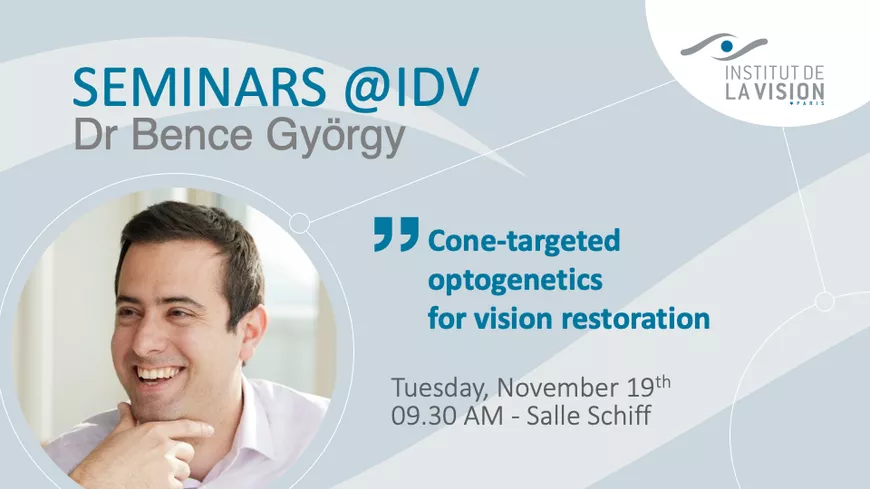Cone-targeted optogenetics for vision restoration
Invited by Deniz Dalkara, Bence György, MD, PhD Assistant Professor & Head of Clinical Translation, Institute of Molecular and Clinical Ophthalmology Basel (IOB), will speak on Tuesday November 19th at 09.30 AM. Meet in Schiff room (15-20 Hospital).

Abstract
Optogenetics has the potential to restore visual function in blind subjects, but current clinical-stage approaches do not allow restoration of natural retinal image processing and may lead to the perception of distorted images. We developed a cone-targeted adeno-associated viral vector expressing a red-shifted optogenetic channel that restored light responses and reactivated the retinal circuitry in human retinas. Light responses, temporal kinetics, and the peak firing rates of different types of retinal ganglion cells were similar between optogenetically-treated and physiologically photosensitive human retinas.
Light levels equivalent to a brightly lit room evoked light responses. Subretinally injected vectors in non-human primates led to optogenetic responses in retinal ganglion cells similar to the human retina. To identify candidate patients, we conducted a retrospective, multicenter, ocular imaging study in patients with generalized inherited retinal diseases and low vision. We found that sixty-one percent of such patients have significant central foveal preservation, suggestive of cones that can be targeted by cone-targeted optogenetics. The developed gene therapy vector is a candidate for restoring high-resolution foveal vision in blind patients.
About Bence György
Dr. Bence György, MD, PhD, is an Eccellenza Assistant Professor and Group Leader at the Institute of Molecular and Clinical Ophthalmology Basel (IOB). A translational researcher, Dr. György earned his MD and completed a PhD in Molecular Genetics at Semmelweis University, Hungary, where he studied extracellular vesicles. He expanded his expertise during a postdoctoral fellowship at Massachusetts General Hospital and Harvard Medical School, developing gene therapy and genome editing techniques for neurosensory diseases.
Dr. György’s current research focuses on optogenetic vision restoration, precision gene editing, and multicenter clinical studies supporting translational programs. He serves on several advisory boards, including the Swiss Expert Committee for Biosafety (SECB) Gene Therapy Working Group, Usher Syndrome Society, Save Sight Now Europe, and Fondation Pour l’Audition. Dr. György has authored numerous publications, including in top-tier journals, and holds several patents in gene therapy. Additionally, he is a scientific founder of RhyGaze AG (www.rhygaze.com), a Basel-based spinout focused on developing a cone-targeted optogenetic vision restoration approach.
